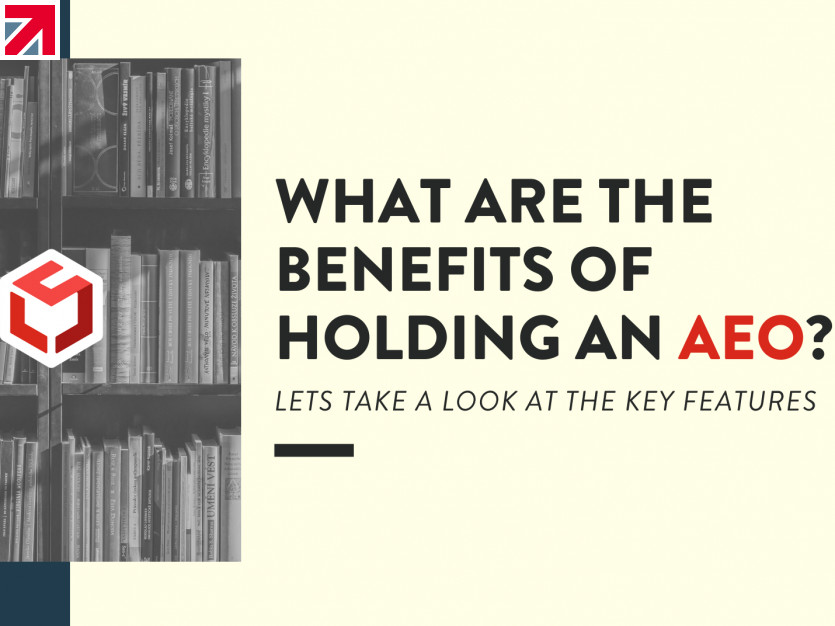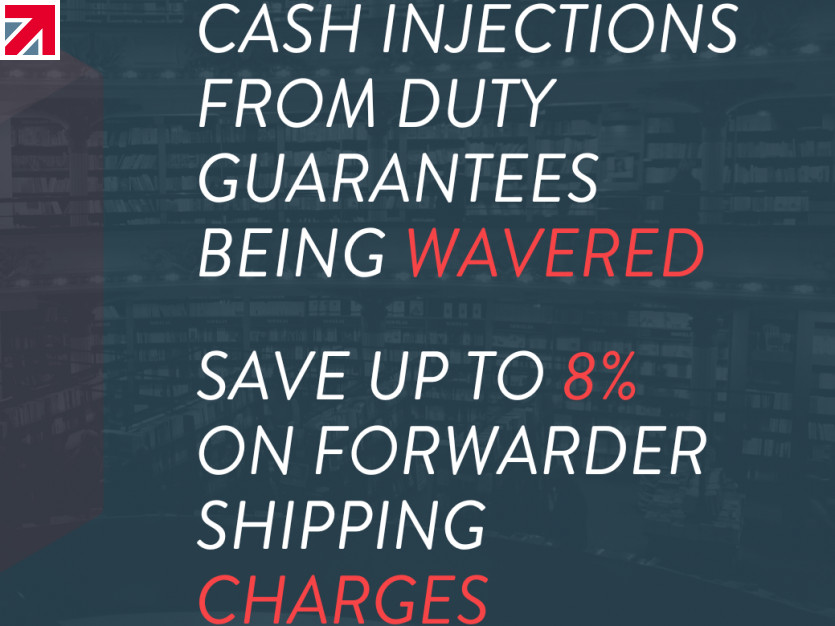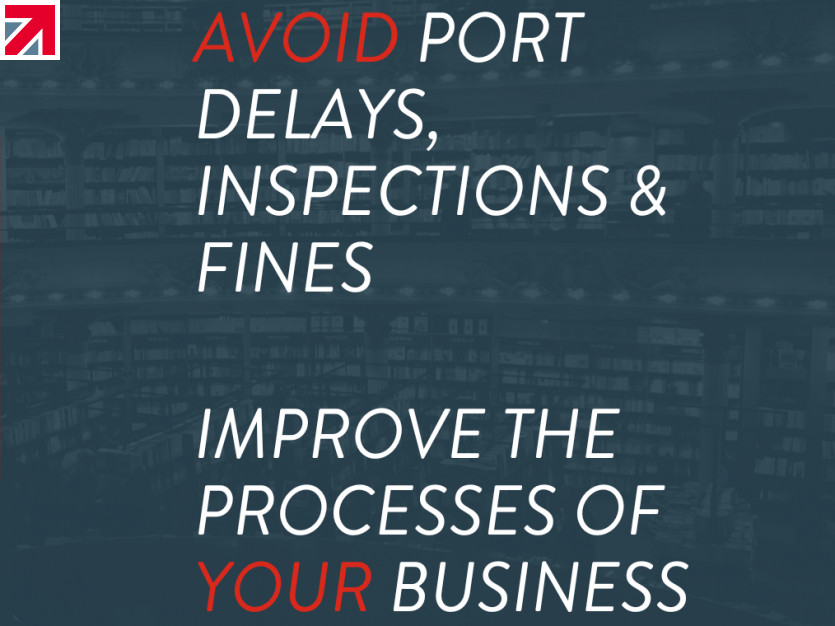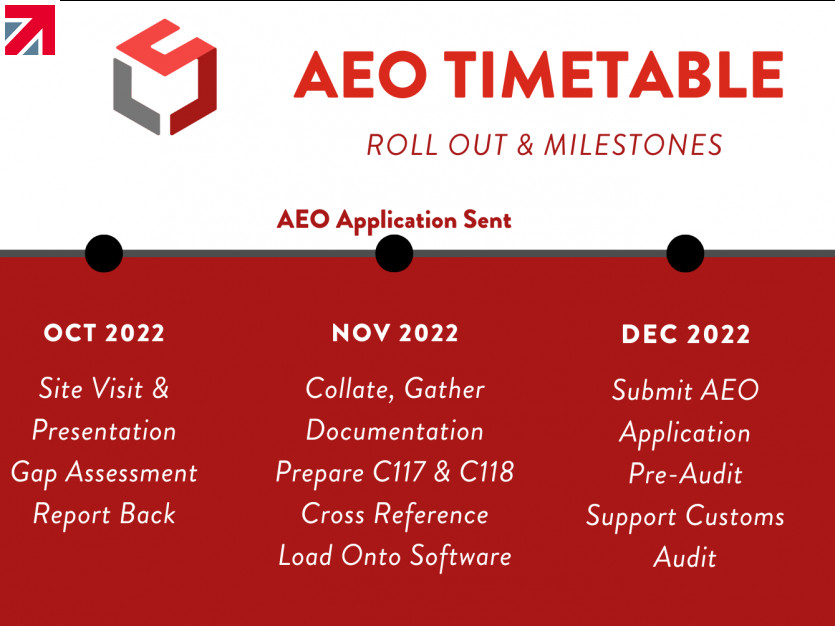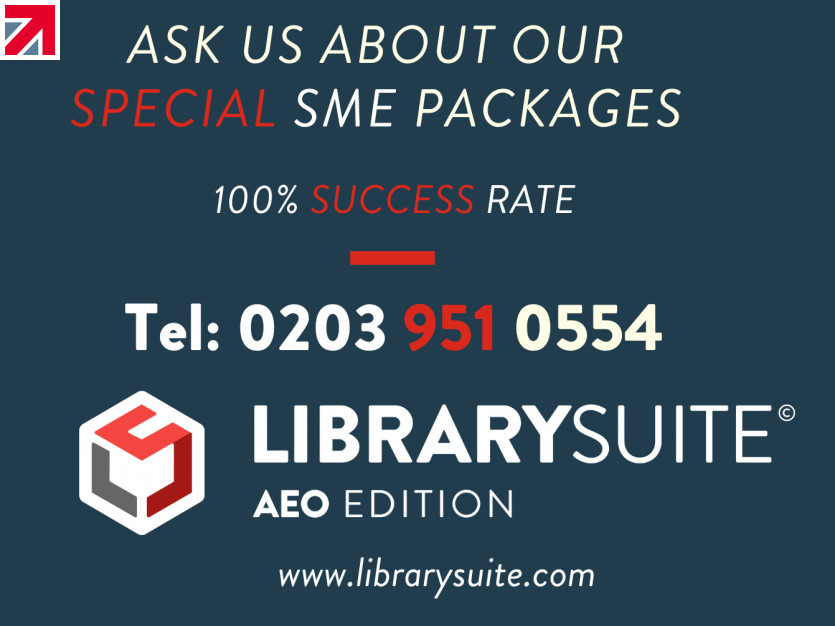Benefit from applying for an AEO - International Trade
There are a number of very good benefits from qualifying companies who want to have an AEO status with HM Customs. What does it stand for?
AEO stands for Authorised Economic Operator and its a worldwide standard recognised by Customs across all boarders around the world. Obtaining an AEO means that HM Customs have authorised you as a consignee as being a Trusted Trader, presenting no risk in the International Supply Chain. There are 2 types and depending on where you import/export and the volumes there's a different in benefits. Feel free to get in touch after this article and our team can help you. Email at the end.
What if my Forwarder has the AEO am I covered?
No. The Forwarder is covered as the AEO is relevant to the company holding it. But a forwarder alone holding this trusted trader status means absolutely nothing to you if you don't hold the AEO yourself. It can also be costing you up to 8% on your shipping costs without you realising it as well. Forwarders are known for being really good at moving goods but are notoriously poor at apply correct tariff codes to consignments and sometime not even assigning them at all. In this case who do you think is responsible for fines by Customs you or your forwarder? After all, you are paying for a service, right?
Wrong. Correctly applied tariff codes and paying the right duty rate is completely down to you as the importer and exporter. What? That's criminal you say. It is... and that's why we wrote this article today.
As stockholder and importer/export you are the consignment owner, and you are wholly responsible for the supply chain compliance. It doesn't matter how nice they are, or how well they treat you, if they get it wrong, they take no responsibility whatsoever. Ask them if you don't believe me. The AEO provides a few benefits, and these are potentially huge by the way. HM Customs are not advertising this to help businesses. It is estimated that there are over 250,000 UK SME's that need an AEO and have idea what it is and why they need it.
A TV Ad wouldn't have gone a miss right?
Anyway you are going to know now.
Financial Benefits of a AEO
How about having those Customs Guarantees wavered? That's right these can be wavered by up to 70% At Library Suite we have been able to support company's do this and have released over £150m to date.
What about saving those bank charges to have the guarantee in place?
What about saving between 4-8% on your shipping costs?
You may have thought about having a Duty-Free Customs Warehouse. This is a great way to reduce overheads. The work involved in reducing the costs is the same work required for an AEO. Whilst getting your AEO in place did you know we can help you also prepare for all of the other Customs benefits? Yes, there are more!
Financially then, the AEO is a massive cashflow injection for all companies that meet the requirements. But that's not all!
The story for International Supply Chains
There are approximately 10 top shipping companies that manage over 90% of the cargo around the world. Each of these shipping lines own over 3000 shipping vessels and carry approx. 2-3 million 20’ containers a year. Shipping Lines transport the containers for importers and exporters and have scheduled routes. There are no trade wars within shipping companies and as such they operate frictionless services from port of origin to destination. They work on filling the space on each vessel in order to maximise the profit on each journey. As long as the space is utilised, they have no issue with their charging.
In other words, they don’t fight for the work because they know there is plenty of it available and why fight to earn less when they can be quite content with making the money and protecting the prices they so enjoy? That’s why cargo and shipping line prices are fairly high with seasonal dips. In recent years these high have been ridiculous.
One shipping line made more profit in one year than the previous 9 years profit combined.
How are they doing this?
Well apart from hiking up the prices within this monopoly they have some other ways to make money.
Now issues can come when shipping lines want their containers back for reloading more cargo and what has been negotiated as ‘free time’. So depending upon where you are, what you’ve negotiated you can have 5-10 days of ‘free time’ – which gives you time to pick up, off load and return your container. However, the more ‘free time’ you have the more expensive the charges are! Shipping Lines won’t be losing out because you have delays.
Delays in Exporting and Importing are affected when you go over this ‘free time’. Then you experience fines. Not only do the Shipping lines fine you but so does the Port for clogging up their space at the quay and they charge a daily rate for this too.
Customs also play a part. They have a Risk Management process whereby they measure the chance of risk of containerised goods. This risk applies to foodstuffs as well as non-food stuffs. Textiles has no preferential treatment in this risk measure by Customs.
Importing Goods / Exporting Goods delays are not just confined to foodstuffs or military licensed goods but as pointed out by the CEO of Customs affects textiles and automotive types of goods too. Checks are checks after all. Foodstuff has for years its own separate process of checking and has a separate section of border control checks carried out by Customs. These checks are not to be confused with the checks at border from a consignment say from Turkey that is an EU member but not part of the EU market. Therefore, goods normally transported from there are subject to checks as they come via road through the Dover entrance into the UK. Port for sea freight, air freight or crossings for transport are all measured using the risk assessment administered by Customs for each country.
Checks at border are based upon the Risk Assessment and such are based upon things like; the amount of volume, full loads for example, the type of goods, where they came from and the trailers are often left unaccompanied as trailer swaps take place creating extra checks. Those with an AEO have a low Risk Rating.
The US version of AEO is called CTPAT (Customs Trade Against Terrorism) has changed since January 1st 2020, with increased criterion on the standards. The federal law has prevented any new applications until 1st June 2020 so as to allow this time to re-authorise existing businesses to the new standard. The new changes increase the risk management of the supply chains in that businesses need to be able to demonstrate the shipment of goods, those involved from raw material to finished product along with those associated with its delivery inbound are all full traceable, audited and cleared as secure through their internal processes of risk management. This will mean anyone importing into the USA will have to make sure all suppliers are safe and secure to a higher standard than before. Those not meeting those standards will experience delays and those exporters into the USA not mutually recognised with an AEOS will definitely be treated as secondary in the tier system. In other words, they will not be given easy access across border but delayed in preference to those goods with CTPAT recognition. Trump has stopped shipments from China and non-food exporters into the US. They have found they have been rejected by buyers like Walmart etc as they breached their delivery SLA’s. One bicycle manufacture brand shipping from China has had 200,000 bikes (10% of the 2 million annual order) refused from Walmart on the basis of out of time supply due to delays. These are being disposed of rather than the cost of shipping back as they are Walmart’s own brand and are unsaleable. The costs on shipping on-foods like textiles from delays can be significant.
So, what are the benefits of the AEO verses cost?
Companies with AEO in place, benefit in a variety of financial, operational and administration areas.
- Financially
- Penalties
AEO avoids delays. The AEO quality mark means under the Customs risk Assessment because HM Customs have come to audit your business they have seen for themselves that you are a safe, secure business with Customs Compliant Supply Chains. Under their risk Assessment at border you will not come up under their radar to stop, inspect and delay your shipments. Post-Brexit you will in both UK, European and cross Atlantic borders experience delays. CTPAT across the states is changing as from 1st January 2020 to tighten up controls of imported goods and exporting from the USA. The whole of the USA is being brought up to standards and no new CTPAT applications are being sanctioned until after June 1st when the process of update has been completed.
So, what do penalties look in the UK?
Delays cause penalties because the Port and Shipping Line charge for goods not collected, moved and or if the containers are not collected and returned in time. With increased border controls and checks across the UK, Europe and USA those goods without preferential clearance will be secondary in moving off the boats, off the quays and for border clearance processing. AEO gives you preference in clearance and goods being moved. With a ship holding 3000 containers those who are going to be easy for the Shipping Lines and ports to clear out are obviously going to be first in the queue, those not with AEO are going to be secondary and if this means delays then the Shipping Lines and Ports don’t mind because they fine you anyway and get more money. This makes sense even more so as Deloitte, Institute of Export etc all say as we leave the EU.
Penalties vary from Port and Port and Shipping Line to Shipping Line however they range from:
Port charges at £80 per day per container to £100 per day per container.
Shipping Line charges range from £90 per day, per container to £190 per day, per container.
So, as an example: 10 containers delays by only 2 days will cost between £2200-£4600 in fines. They have the hold as they hold your goods right? So if you stop payment they hold your goods in another shipment or can 'exercise a leaning'
With literally 100’s and 100’s of container movements a year this makes shipping forms and forwarders a lot of money. Can you afford this level risk?
Don’t forget this is just 10 containers we are talking about . If you are increasing your container movements into EU and the US where they are increasing their checks and inspections at border, then your risk is increasing too.
Claiming Back on Fines
If you do incur a delay and fines then the other alternative is to try and mitigate these through raising appeals, counter claims and finding ways to claw the penalties back. This will take time and administration money and you may claw back 10% but certainly not 100%. Can you afford the time to constantly claim back on fines and penalties? No one really measure admin time but as a DTI measure please see the following:
Company Turnover: £10m
Employs: 100 staff working 40hr week
Ave Person to Turnover impact is approximately, £50 per hour per person employed
If 5 staff in involved in spending 50 hours in admin trying to reclaim against a £4600 penalty cleared or reduced that’s costing you £12500 in admin hours. Making it a false economy. How much better is it using your £12,500 making you £100k in improvements to reduce cost effectively or create a process to initiate cash rewards than fight your delays for not having and AEO and or non-compliance?
Without the AEO you place yourself at high risk of these kind of negative costs and issues. In recap the delays of just 2 days for the 10 containers would now cost you potentially
The Penalties and Fines of: £2-4600
Admin to Fight the Charge: £12,600
This is already nearly half the cost of putting the AEO in place and we are just talking about 10 containers being put through the secondary route because of not having the AEO.
Just 10 containers in delay mode = half the cost of running an AEO
Litigation, Claw Back and SLA’s
Depending on the situation cause by delays but the costs can then lead into areas of ‘Claw Backs’ taking place, SLA’s agreements being broken and litigation costs to either fine or defend your position. This Risk increases along with you not having and AEO.
Loss of Sales & Reputation
Ultimately not only do delays cause fine and penalties but you also potentially lose business. If its not in the warehouse in time, then you won’t sell the item to the customer and their confidence will lessen. They then talk about it and reputation is damaged. These figures are not quantifiable but its probably 10 times the cost the cost your AEO. One person that's unhappy talks to 10 friends and family they are then talking to their friends and family and this affects not a days sales missed but potentially a lifetime of lost sales. Prevention is better than cure and so is early correction than escalation.
Additional Hidden Benefits
- Going through the AEO Process forces the business to look at its customs compliance procedures and requirements which can lead to;
- Avoiding Penalties
- Improving in import accounting systems
- Efficient processing of duty reliefs
- Overall cost savings
- Organisations can map out their supply chain scenarios to;
- Control Suppliers
- Make processes more effective
- Reduce logistic Costs
- Reduce Lead Times
- Improve the Safety and Security of Goods and Staff reducing theft etc
Operationally
- Importing
- AEO Status on import and export declaration reduces the risk rating
- Creates greater access to priority clearance
- Reduces administration
- Enables options for Temporary Storage
- Traceability of Flows of Goods
- Increased Transport Security
Exporting
- AEO status on export declarations reduces risk rating
- Pre-departure messaging information reduced
- Fewer delays in despatch
- Improved security between supply chain partners
- Quicker access to certain customs procedures including HMRC safety and security procedure
- AEO approved companies’ shipments gain quicker clearance on arrival overseas
As the number of businesses with AEO status steadily increases, so will the pressure on other companies to also comply. Priority clearance for AEO certificated businesses will, by default, mean that non-certificated organisations will be dealt with as a secondary concern. When time is of the essence, such delays in delivery will inevitably prove ever more costly.
There are some other very large fiscal benefits to companies with an AEO. We can explain how much this cashflow benefits are worth to you and these alone would more than enable you to gain an AEO with zero cost.
What other Businesses are doing?
Potential to Move Goods Exporting and Importing to Tynes Port?
Matt Beeton, Port of Tyne’s Chief Executive Officer, said:
“The award of AEO status means that the Port of Tyne will be fully prepared whatever the outcome of the ongoing Brexit negotiations. Our customers will know that we’re a safe and secure business partner and that we’ll have streamlined arrangements in place to move goods across international borders quickly and easily.
“Gaining AEO accreditation is therefore an important milestone and one that we’re very proud of – our team’s been working very hard to achieve this over the past 12 months.”
The AEO award will also benefit our customers, helping them to secure their supply chains and minimising potential delays.
Graeme Hardie, Port of Tyne’s Head of Operations, said: “The Port of Tyne achieving AEO status is great news for our customers. It will, potentially, avoid delays, creating greater efficiencies and will ensure goods are imported and exported as swiftly and securely as possible.”
Post-Brexit, AEO certification will become even more desirable as an internationally recognised tool to keep cargo moving. Already recognised by the United States, the certification is expected to be recognised between the UK and EU borders.
Ref: https://www.ukpworldwide.com/supply-chain-security/
That email: paulsims@librarysuite.com
Find out what hidden admin costs are involved in managing compliance at our website: www.librarysuite.com
Find out more at our sister consultancy firm: www.thebluebearpartnerhsip.com and work out what fines can actually cost you with our fine calculators.
What qualifies our advice:
We have been delivering AEO's / CTPAT's for over 10 years now and all of our AEO's pass through Customs first time.
Our client include, M&S, Triumph Motorcycles, Monsoon Accessorize, The White Company, ASOS, In The Style. Missguided and Bohoos labels Oasis, Karen Millen and Warehouse so mention a few. We are members and committee members of ACITA (Automated Customs and International Trade Association) and speak directly to HM Customs about International Trade Matters. We are members of Chambers of Commerce and SIITACE (Society of Independent International Trade Association) We hold qualifications in IOSH (Institute of Occupational Safet & Health) CIPD (Chartered Institute of Personnel Development) Lean Practitioners (BI-T/NLP/Assessor Coach) Food & Drink Manufacturing, We can provide 13 case studies in international Supply Chain Optimisation and references upon request. We are registered with HM Customs as a Customs Compliance Training Organisation and deliver on Customs Tariff Codes Audits as well as Customs Entry Processing for Imports/Exports. We also have FX Currency, and Freight Negotiation partners and Trade Finance facilities through our partnerships. Our mission is to support UK business within International Trade complexities with client-based solutions that reduce cost whilst maintaining quality standards.
Additional Quote:
It is possible to speed up your passage through UK customs by becoming an Authorised Economic operator (AEO), but approved procedures and internal controls must be implemented to qualify for priority treatment.
If you have AEO certification, customs can carry out checks on your premises, to ensure your procedures and internal security systems are up to standard. A customs audit will require you to make disclosures about your business activity.
AEO status also offers additional benefits. It helps confirm you as a trusted trader with business partners. UK AEO status is recognised in other countries.
- Ref: https://www.prepareforbrexit.com/insights/dont-delay-logistics-plans-to-prepare-for-brexit/
- Ref: https://www.nof.co.uk/news/2019/september/port-of-tyne-granted-aeo-customs-check-status/
Sources and references:
Institute of Export………………………………………………………..https://www.export.org.uk/news/320338/AEO--what-is-it-and-could-your-business-benefit.htm
Croners……………………………………………………..https://app.croneri.co.uk/topics/authorised-economic-operator-aeo-status/indepth?product=142
Find out more about Library Suite Ltd on their member profile page here
Member-created content 3 years ago | From members
